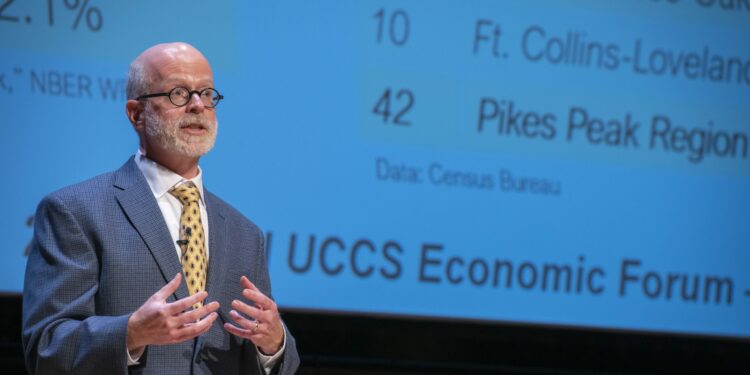
Bill Craighead, an economist, understands that economists think differently than most consumers.
“My interpretation of the economy as an economist is probably much more positive than public opinion,” said Craighead, sharing what he planned to say before taking the stage to host this year’s UCCS Economic Forum, held Thursday afternoon. Inflation, he said, “is clearly past tense. This happened in 2021 and 2022. But it’s lingering in people’s minds.”
But he’s also a consumer and spends money in Colorado Springs, where he lives and works as the program director of the forum, housed at the University of Colorado Colorado Springs. He’s felt the impact of inflation on his own household (“We did get a shockingly high estimate on the fall leaf cleanup for our yard, so I ended up doing it myself, even though I hate yard work,” he said). But his job is to interpret the data to help guide businesses and local leaders. He has to find the right sensitivity for sharing his findings because, well, they’re not always great.
So, on Thursday at the Economic Forum, Craighead began with some positive observations before ending on a more cautionary outlook. Wages aren’t rising as fast as they had in 2021 and 2022. The so-called misery index, which combines the inflation and unemployment rates, was at 6.7 in August, much lower than the nation’s 76-year average of 9.2.
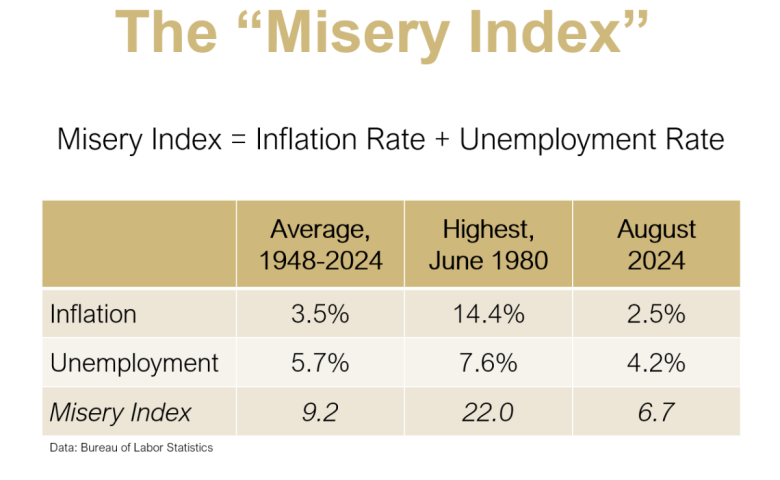
“I keep hearing people say they think the economy is lousy,” he said at Thursday’s forum. “Not that we don’t have some real problems and challenges (but) I was a faculty member teaching macroeconomics in 2008, 2009 and 2010. I know what the data looks like when the economy’s terrible and this isn’t it.”
The U.S. Bureau of Labor Statistics doesn’t track price changes in Colorado Springs (it only does Denver). So he hunts down as much local data as possible for clues on how the city’s economy is really performing.
The monthly number of job openings in the Pikes Peak region has been nearly cut in half since the labor shortage three years ago, according to Lightcast, a private job-listing aggregator he uses to better understand whether local employers are hiring. In June, Lightcast estimated the area had 22,307 job openings, a count that is now below pre-pandemic levels.There is, however, still “significant demand” for lower-wage occupations in retail, fast food and counter workers.
Meanwhile, local employers report that payrolls are growing — in June, it was 9.6% higher than before the pandemic. But the rate of growth in the first half of 2024 was much lower than Colorado and the nation. Job growth has slowed. In July, Pikes Peak unemployment also rose to 3.9%, a tenth of a percentage point higher than the state’s own rate and two-tenths lower than the U.S., according to the UCCS update.
“These other indicators definitely say it’s gotten a lot tougher to find a job. There’s a lot less hiring,” Craighead said. “It is something I’m pretty concerned about because when you look at what happens in economic downturns, the reason unemployment goes up is mainly because hiring dries up, not because of huge numbers of layoffs.”
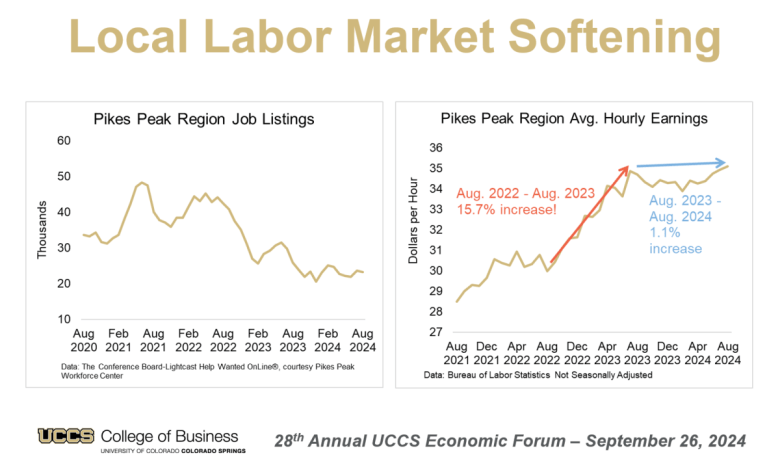
Unlike most cities in America, though, Colorado Springs has a cushion that isn’t always evident in job data. Its non-civilian workforce numbers about 38,320, according to last year’s Census data. Add that to the city’s civilian workforce of around 330,000 people, military workers are about 10% of the region’s workforce.
“By this measure, local employment has continued to grow, but it’s been growing at a much slower rate and we definitely see some signs of a softening in the labor market,” he said. “
Housing affordability tops Colorado Springs’s challenges
Housing data from the Pikes Peak Association of Realtors median single-family home prices slightly lower than the peak in June 2022, at $490,000. Back in June 2019 before the pandemic, the price was $328,000.
Prices haven’t fallen, according to the latest PPAR report with August numbers at $500,000, up 4.2% in a year. The higher prices are also keeping housing on the market long, with homes staying on the market for 36 days before a sale. Five years ago, it was taking 23 days.
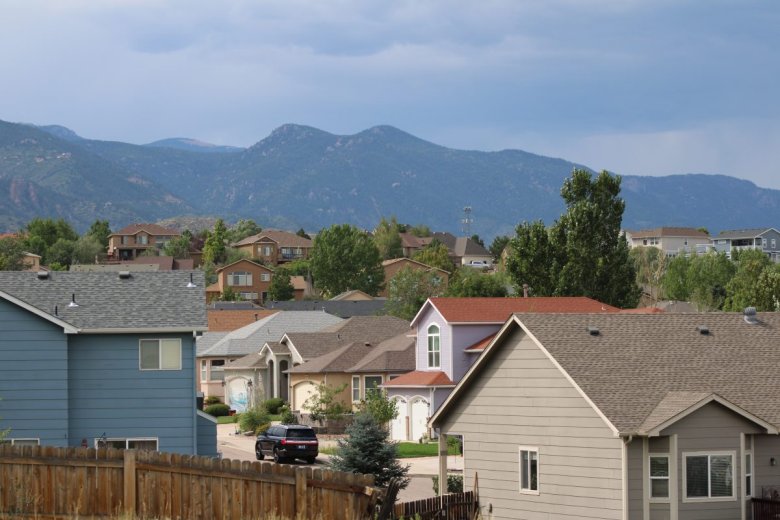 Homes line the foothills outside Colorado Springs on Sept. 11, 2024. (Luke Runyon, The Water Desk)
Homes line the foothills outside Colorado Springs on Sept. 11, 2024. (Luke Runyon, The Water Desk)
“Housing affordability is still, by far, the number one issue for the economy of the region,” he said. “And it’s still, I think, the number one negative about the U.S. economy nationwide because many markets are in a similar situation to us.”
The recent Federal Reserve rate had been expected, though mortgage rates went up after the cut. On Friday, the 30-year fixed rate for a mortgage was 6.20%, lower than the 8% last October, but higher than the 6.15% the day rates were cut, according to Mortgage News Daily.
Patrick Muldoon, president of real estate firm Muldoon Associates, with offices in Colorado Springs and Pueblo, agreed. Wages aren’t rising enough to keep up with higher home prices, which are still near their all-time high. He recommends renting to folks who are uncomfortable with the high cost of buying a home. While lower interest rates do typically help, even the recent Federal Reserve cut doesn’t change his mind.
“I keep telling people that if this were an interest rate problem, then new home builds would be flying off the shelf. Why? New home builds are offering 4.9, 3.9% fixed 30-year rate notes. Most of them are offering to buy down so you can get a 1.9” that will increase to 4.9, Muldoon said. “New home builders are hitting us up every day to let us know about these ‘unbelievable rates.’ … And they, too, are struggling to get properties moved.”
He’s doing something a little unusual for someone in the business of selling houses. He’s pushing rents. According to ApartmentList local rent data cited in the UCCS report, the average 2-bedroom apartment rents have fallen 7.2% in two years, to $1,415 a month, which makes it more attractive to rent than purchase.
“I’ve told most of my buyers, honestly, look, nothing is pointing to a better real estate market next year. We have no data to support that,” Muldoon said. “If it’s a struggle or you’re uncomfortable — rent. There’s no downside to rent right now. You’re going to save money.”
Coloradans and AI: Right here, right now
By the time you read this, my SunFest 2024 panel on artificial intelligence will be done and we’ll be posting the recording soon for those who missed it (which may be many of you readers). Thanks to all who came out in person!
It was a good session to not skip because according to the most recent What’s Working reader poll, the vast majority of folks who shared their thoughts — that’s 80% of about 40 responses — either don’t know what this is, are scared of it, don’t like it or just don’t care.
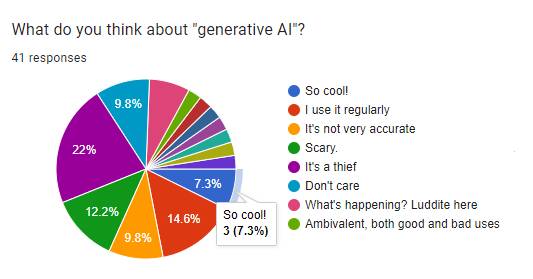 Most What’s Working readers aren’t too fond of the new-fangled artificial intelligence.
Most What’s Working readers aren’t too fond of the new-fangled artificial intelligence.
I’ll share more about the panel insights in a future column, but here are a few comments shared by readers who use technologies like generative AI:
“I asked why a certain flight on a certain airline at a specific city didn’t allow online check-in. The response was within seconds and it provided the reason, the specific flights with the flight numbers and destinations. It was an easy to read paragraph with source citations. I use Perplexity and find it awesome.” ~ Anonymous
“I’m a researcher and educator and it’s helped me in both areas. From big things like difficult coding which would have taken days before (and now takes hours), to small things like designing better rubrics for class assignments. Unfortunately, students are starting to use it to answer questions, even ones I ask IN CLASS. I worry that it is increasing productivity but depleting both critical thinking skills and on-the-spot improvisation.” ~ Kendall in Fort Collins
“I use it a lot to help generate ideas and in my daily writing. For example, I used ChatGPT to help make an email sound more interesting and engaging for a creek week cleanup I am helping to sponsor.” ~ Anonymous
“There are plenty of use cases in which I would enthusiastically support AI research and development, like medical research. But it has NO place in the arts, especially since not a single AI product attempting to erase human labor in the arts has been built using ethical means.” ~ Emily in Littleton
➔ Missed the poll? Take it here: “Thoughts on AI?”
Sun economy stories you may have missed
 Ken and Barbie Leach, married for 50 years, click into their skis after renewing their vows following the Marry Me and Ski Free annual event, Tuesday, Feb. 14, 2023, at Loveland ski area. The couple have season passes to the ski area and have renewed their vows at the annual event several times. (Hugh Carey, The Colorado Sun)
Ken and Barbie Leach, married for 50 years, click into their skis after renewing their vows following the Marry Me and Ski Free annual event, Tuesday, Feb. 14, 2023, at Loveland ski area. The couple have season passes to the ski area and have renewed their vows at the annual event several times. (Hugh Carey, The Colorado Sun)
➔Telluride ends discounted and free skiing for seniors, joining a long trend of reducing perks for skiers over 80. Purgatory and Sunlight are the last two Colorado ski areas to offer free season passes to octogenarians >> Read story
➔ Colorado policymakers asked PERA what it would take to bolster its odds of full funding. The answer: $13 billion. The Colorado Public Employees’ Retirement Association has less than a 50-50 chance of reaching its goal of full funding by 2048 >> Read story
➔ Broomfield nonprofit agrees to pay $449,999 to 10 workers who were fired after forming a union. The food nonprofit Big Green, founded by Kimbal Musk, agreed not to appeal and must require all managers to go through employee-rights training >> Read story
 The sign on Colorado PERA headquarters in the Capitol Hill neighborhood of Denver on Sept. 18, 2018. (Eric Lubbers, The Colorado Sun)
The sign on Colorado PERA headquarters in the Capitol Hill neighborhood of Denver on Sept. 18, 2018. (Eric Lubbers, The Colorado Sun)
➔ Colorado policymakers asked PERA what it would take to bolster its odds of full funding. The answer: $13 billion. The Colorado Public Employees’ Retirement Association has less than a 50-50 chance of reaching its goal of full funding by 2048 >> Read story
➔ Commerce City sustainability manager says she was fired for calling out Suncor. Rosemarie Russo was questioned and then lost her job after sending frank anti-pollution appeals from residents to Suncor’s Canada headquarters >> Read story
➔ Amid flurry of newspaper closures on Colorado’s Eastern Plains, Burlington sees a heroic revival. But another century-old paper, the Plainsman Herald in Springfield, plans to stop printing at the end of the year >> Read story
Other working bits
➔ Western Colorado University waives college application fees. With around 4,000 new students applying each year, this Gunnison school could feel a financial impact following its decision to eliminate the $30 fee, which started Aug. 1. But, spokesperson Seth Mensing said, most students qualify for financial support anyway so the impact isn’t that large.
“As a regional public university, our charge is to serve the students who will staff Colorado’s workforce,” Mensing said in an email. “Right now, about 80% of our students receive some level of financial support, and while a $30 fee doesn’t seem like a deal-breaker, it’s an out-of-pocket expense that can be hard for some families to cover. We want to make a high-quality degree accessible to everyone. Cutting the application fee is one way to do that.”
Last year, the school and some other regional public universities “received a substantial increase in state funding because the state sees a return on that investment,” he said, so waiving the fee is the school’s investment in future classes.
➔ Greeley seeks startups for free accelerator. There’s a few days left to apply to be in the Fall 2024 cohort of gBETA Greeley. You just need to apply by Monday. This is the 7-week business accelerator to help local companies “launch products, generate initial revenue and explore funding options,” according to organizer gener8tor and the city. The program starts Oct. 16 and is hosted by downtown Greeley coworking space Ambry. >> Details
Got some economic news or business bits Coloradans should know? Tell us: cosun.co/heyww
Phew! Glad this week is over. Enjoy the weekend and don’t think too much about the machines. People (still) rule the world! Remember to check out The Sun’s daily coverage online. As always, share your 2 cents on how the economy is keeping you down or helping you up at cosun.co/heyww. ~ tamara
Miss a column? Catch up:
What’s Working is a Colorado Sun column about surviving in today’s economy. Email [email protected] with stories, tips or questions. Read the archive, ask a question at cosun.co/heyww and don’t miss the next one by signing up at coloradosun.com/getww.
Support this free newsletter and become a Colorado Sun member: coloradosun.com/join
Corrections & Clarifications
Notice something wrong? The Colorado Sun has an ethical responsibility to fix all factual errors. Request a correction by emailing [email protected].
Type of Story: News
Based on facts, either observed and verified directly by the reporter, or reported and verified from knowledgeable sources.
Source link : http://www.bing.com/news/apiclick.aspx?ref=FexRss&aid=&tid=66f891e9cb564c6b8b94b9980efb1cd3&url=https%3A%2F%2Fcoloradosun.com%2F2024%2F09%2F28%2Fcolorado-springs-job-economy-affordable-housing%2F&c=15664774878161357272&mkt=en-us
Author :
Publish date : 2024-09-28 00:01:00
Copyright for syndicated content belongs to the linked Source.

